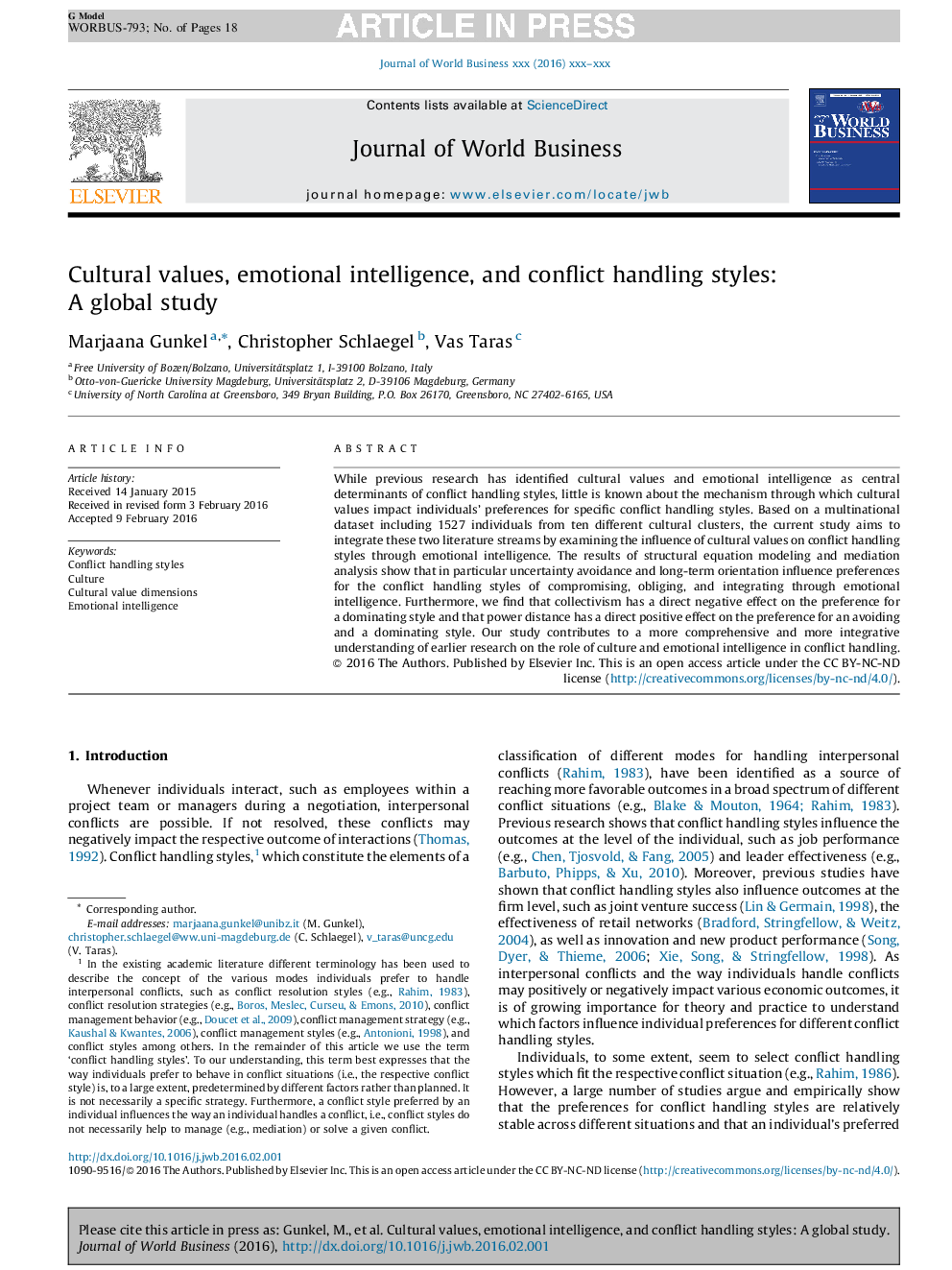| کد مقاله | کد نشریه | سال انتشار | مقاله انگلیسی | نسخه تمام متن |
|---|---|---|---|---|
| 5107170 | 1377569 | 2016 | 18 صفحه PDF | دانلود رایگان |
عنوان انگلیسی مقاله ISI
Cultural values, emotional intelligence, and conflict handling styles: A global study
ترجمه فارسی عنوان
ارزش های فرهنگی، هوش هیجانی، و سبک های درگیر در جنگ: یک مطالعه جهانی است
دانلود مقاله + سفارش ترجمه
دانلود مقاله ISI انگلیسی
رایگان برای ایرانیان
کلمات کلیدی
سبک های دست زدن به تقابل، فرهنگ، ابعاد ارزش فرهنگی، هوش هیجانی،
ترجمه چکیده
در حالی که تحقیقات قبلی ارزش های فرهنگی و هوش هیجانی را به عنوان عوامل تعیین کننده اصلی سبک های درگیری در اختیار دارد، در مورد مکانیزمی که از طریق آن ارزش های فرهنگی بر خصوصیات افراد برای سبک های برخورد ویژه ای برخورد می کند، شناخته شده است. بر اساس یک مجموعه داده های چند ملیتی از جمله 1527 نفر از 10 خوشه فرهنگی مختلف، مطالعه حاضر با هدف بررسی ادغام این دو جریان ادبی با بررسی تأثیر ارزش های فرهنگی بر سبک های مدیریت درگیری از طریق هوش هیجانی انجام شده است. نتایج حاصل از مدل سازی معادلات ساختاری و تجزیه و تحلیل میانجیگری نشان می دهد که به ویژه عدم اجتناب از عدم اطمینان و جهت گیری طولانی مدت، ترجیحات سبک های مبارزه با تعارض، سازش و ادغام از طریق هوش هیجانی را تحت تاثیر قرار می دهند. علاوه بر این، متوجه می شویم که جمع گرایی یک تاثیر منفی مستقیم بر ترجیح سبک سبک و قدرت دارد و فاصله قدرت تاثیر مثبت مستقیم بر ترجیح سبک اجتناب و غالب دارد. مطالعه ما به درک جامع تر و یکپارچه تر از تحقیقات قبلی در مورد نقش فرهنگ و هوش هیجانی در برخورد با درگیری کمک می کند.
موضوعات مرتبط
علوم انسانی و اجتماعی
مدیریت، کسب و کار و حسابداری
کسب و کار و مدیریت بین المللی
چکیده انگلیسی
While previous research has identified cultural values and emotional intelligence as central determinants of conflict handling styles, little is known about the mechanism through which cultural values impact individuals' preferences for specific conflict handling styles. Based on a multinational dataset including 1527 individuals from ten different cultural clusters, the current study aims to integrate these two literature streams by examining the influence of cultural values on conflict handling styles through emotional intelligence. The results of structural equation modeling and mediation analysis show that in particular uncertainty avoidance and long-term orientation influence preferences for the conflict handling styles of compromising, obliging, and integrating through emotional intelligence. Furthermore, we find that collectivism has a direct negative effect on the preference for a dominating style and that power distance has a direct positive effect on the preference for an avoiding and a dominating style. Our study contributes to a more comprehensive and more integrative understanding of earlier research on the role of culture and emotional intelligence in conflict handling.
ناشر
Database: Elsevier - ScienceDirect (ساینس دایرکت)
Journal: Journal of World Business - Volume 51, Issue 4, June 2016, Pages 568-585
Journal: Journal of World Business - Volume 51, Issue 4, June 2016, Pages 568-585
نویسندگان
Marjaana Gunkel, Christopher Schlaegel, Vas Taras,
